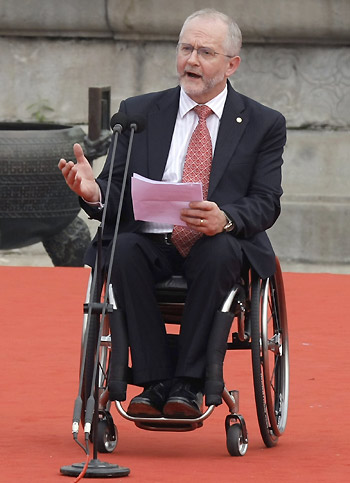PARALYMPICS /
News
IPC expects clean Paralympics
Xinhua
Updated: 2008-09-06 14:42
The International Paralympic Committee (IPC) president Philip Craven Saturday expressed his hope for a clean Paralympic Games.
 |
|
Philip Craven, President of the International Paralympic Committee, speaks during the Beijing 2008 Paralympic Games flame lighting and torch relay launching ceremony at the Temple of Heaven in Beijing August 28, 2008. [Agencies]
|
The Beijing Paralympics will see a historical high number of doping tests, a total of 1,100 expected, since the opening of the Paralympic Village on August 30 while Athens Paralympics had 860 tests in all with 10 positive cases.
"We have been working very hard for the last four years both from a testing point of view and from an education point of view," said Craven at the press conference in the Main Press Center.
"We are very hopeful for the good results in that regard here in this Games," he said, adding that in Turin winter Paralympics, no doping cases were found.
"So I'm looking forward to a clean Games. Obviously, there will be the possibility of that which is being dented by the other positive tests. But I'm very hopeful that this Games here will be as clean as possible and hopefully totally clean," he said.
The Beijing Olympic Games Organizing Committee (BOCOG) continued to carry out the doping control program of the Paralympics following their work done at the Olympics, which saw 4,770 doping tests with six positive results.
"There are differences between the two Games in terms of doping control details but we need to work as hard as before," said Chen Zhiyu, BOCOG official responsible for preparing for the Games doping control program.
The number of doping control officers (DCO) was reduced to 480 from 917 as the number of doping tests dropped and the DCOs were given training applicable to disabled athletes.
"There are new situations concerning athletes with different disabilities," said Chen.
Visually-impaired athletes will be allowed to have an assistant on site while taking doping tests. When athletes change into their daily life wheelchairs after competition prior to the doping tests, the DCOs will oversee the whole process.